小学英语比较级
完整小学英语比较级和最高级
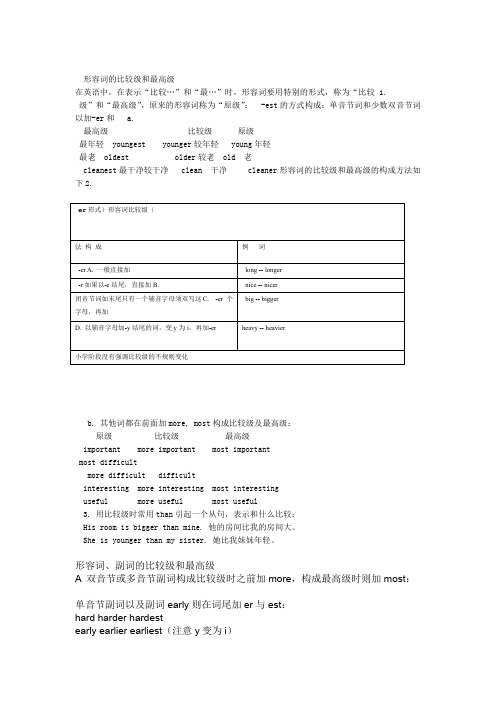
形容词的比较级和最高级在英语中,在表示“比较…”和“最…”时,形容词要用特别的形式,称为“比较 1.级”和“最高级”,原来的形容词称为“原级”: -est的方式构成:单音节词和少数双音节词以加-er和 a.最高级比较级原级最年轻 youngest younger较年轻 young年轻最老 oldest older较老 old 老cleanest最干净较干净 clean 干净 cleaner形容词的比较级和最高级的构成方法如下2.b. 其他词都在前面加more, most构成比较级及最高级:原级比较级最高级important more important most importantmost difficultmore difficult difficultinteresting more interesting most interestinguseful more useful most useful3. 用比较级时常用than引起一个从句,表示和什么比较:His room is bigger than mine. 他的房间比我的房间大。
She is younger than my sister. 她比我妹妹年轻。
形容词、副词的比较级和最高级A 双音节或多音节副词构成比较级时之前加more,构成最高级时则加most:单音节副词以及副词early则在词尾加er与est:hard harder hardestearly earlier earliest(注意y变为i)B 不规则变化:well better bestbadly worse worstlittle less leastmuch more mostfar farther farthest(仅用于指距离)further furthest.much,more,mostA more和most的用法相当自由:You should ride more.你必须多骑马。
小学英语比较级、级大全

★这篇《⼩学英语⽐较级、级⼤全》,是⽆忧考特地为⼤家整理的,希望对⼤家有所帮助!1.在形容词词尾加上 “er” “est” 构成⽐较级、级:bright(明亮的)—brighter—brightest broad(⼴阔的)—broader—broadestcheap(便宜的)—cheaper—cheapest clean(⼲净的)—cleaner—cleanestclever(聪明的)—cleverer—cleverest cold(寒冷的)—colder—coldestcool(凉的)—cooler—coolest dark(⿊暗的)—darker—darkestdear(贵的)—dearer—dearest deep(深的)—deeper—deepestfast(迅速的)—faster—fastest few(少的)—fewer—fewestgreat(伟⼤的)—greater—greatest hard(困难的,硬的)—harder—hardesthigh(⾼的)—higher—highest kind(善良的)—kinder—kindestlight(轻的)—lighter—lightest long(长的)—longer—longestloud(响亮的)—louder—loudest low(低的)—lower—lowestnear(近的)—nearer—nearest new(新的)—newer—newestpoor(穷的)—poorer—poorest quick(快的)—quicker—quickestquiet(安静的)—quieter—quietest rich(富裕的)—richer—richestshort(短的)—shorter—shortest slow(慢的)—slower—slowestsmall(⼩的)—smaller—smallest smart(聪明的)—smarter—smartestsoft(柔软的)—softer—softest strong(强壮的)—stronger—strongestsweet(甜的)—sweeter—sweetest tall(⾼的)-taller-tallestthick(厚的)—thicker—thickest warm(温暖的)—warmer—warmestweak(弱的)—weaker—weakest young(年轻的)—younger—youngest2.双写最后⼀个字母,再加上 “er” “est” 构成⽐较级、级:big(⼤的)—bigger—biggest fat(胖的)—fatter—fattesthot(热的)—hotter—hottest red(红的)—redder—reddestsad(伤⼼的)—sadder—saddest thin(瘦的)—thinner—thinnestwet(湿的)—wetter—wettest mad(疯的)—madder—maddest3.以不发⾳的字母e结尾的形容词,加上 “r” “st” 构成⽐较级、级:able(能⼲的)—abler—ablest brave(勇敢的)—braver—bravestclose(接近的)—closer—closest fine(好的,完美的)—finer—finestlarge(巨⼤的)—larger—largest late(迟的)—later—latestnice(好的)—nicer—nicest ripe(成熟的)—riper—ripestrude(粗鲁的)—ruder—rudest safe(安全的)—safer—safeststrange(奇怪的)—stranger—strangest wide(宽⼴的)—wider—widestwise(睿智的,聪明的)—wiser—wisest white(⽩的)—whiter—whitest4.以字母y结尾的形容词,把y改为i,再加上 “er” “est” 构成⽐较级、级:busy(忙碌的)—busier—busiest dirty(脏的)—dirtier—dirtiestdry(⼲燥的)—drier—driest early(早的)—earlier—earliesteasy(容易的)—easier—easiest friendly(友好的)—friendlier—friendliestfunny(好玩的)—funnier—funniest happy(开⼼的)—happier—happiesthealthy(健康的)—healthier—healthiest heavy(重的)—heavier—heaviesthungry(饿的)—hungrier—hungriest lazy(懒惰的)—lazier—laziestlucky(幸运的)—luckier—luckiest naughty(调⽪的)—naughtier—naughtiestnoisy(嘈杂的)—noisier—noisiest pretty(美丽的)—prettier—prettiestsilly(傻的)—sillier—silliest spicy(辣的)—spicier—spiciestthirsty(渴的)—thirstier—thirstiest ugly(丑的)—uglier—ugliest5.双⾳节、多⾳节形容词,在单词前⾯加上 “more” “most” 构成⽐较级、级:afraid(害怕的)—more afraid—most afraidbeautiful(美丽的)—more beautiful—most beautifulcareful(仔细的)—more careful—most carefulcheerful(开⼼的)—more cheerful—most cheerfulcrowded(拥挤的)—more crowded—most crowdeddangerous(危险的)—more dangerous—most dangerousdelicious(美味的)—more delicious—most deliciousdifficult(困难的)—more difficult—most difficultexciting(令⼈兴奋的)—more exciting—most excitingexpensive(昂贵的)—more expensive—most expensivefamous(的)—more famous—most famousfrightened(受惊的)—more frightened—most frightenedfrightening(令⼈害怕的)—more frightening—most frighteninghard-working(勤奋的)—more hard-working—most hard-workinghelpful(有帮助的)—more helpful—most helpfulhonest(诚实的)—more honest—most honestimportant(重要的)—more important—most importantinteresting(有趣的)—more interesting—most interestingpolite(有礼貌的)—more polite—most politeterrible(可怕的)—more terrible—most terribletired(累的)—more tired—most tired6.不规则变化的形容词:bad(坏的)—worse—worst far(远的)—farther—farthest (far—further—furthest)good(好的)—better—best ill(病的)—worse—worstlittle(少的)—less—least many(多的)—more—most much(多的)—more—mostold(年⽼的)—older—oldest ( old—elder—eldest) well(好的,⾝体好的)—better—best。
小学英语比较级
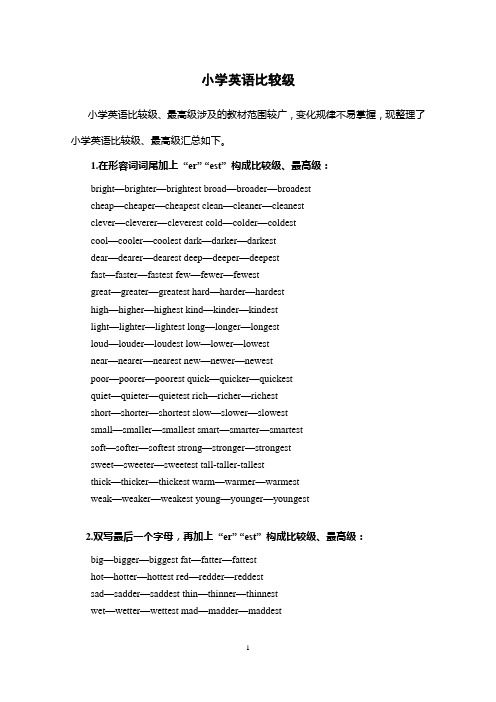
小学英语比较级小学英语比较级、最高级涉及的教材范围较广,变化规律不易掌握,现整理了小学英语比较级、最高级汇总如下。
1.在形容词词尾加上“er” “est” 构成比较级、最高级:bright—brighter—brightest broad—broader—broadestcheap—cheaper—cheapest clean—cleaner—cleanestclever—cleverer—cleverest cold—colder—coldestcool—cooler—coolest dark—darker—darkestdear—dearer—dearest deep—deeper—deepestfast—faster—fastest few—fewer—fewestgreat—greater—greatest hard—harder—hardesthigh—higher—highest kind—kinder—kindestlight—lighter—lightest long—longer—longestloud—louder—loudest low—lower—lowestnear—nearer—nearest new—newer—newestpoor—poorer—poorest quick—quicker—quickestquiet—quieter—quietest rich—richer—richestshort—shorter—shortest slow—slower—slowestsmall—smaller—smallest smart—smarter—smartestsoft—softer—softest strong—stronger—strongestsweet—sweeter—sweetest tall-taller-tallestthick—thicker—thickest warm—warmer—warmestweak—weaker—weakest young—younger—youngest2.双写最后一个字母,再加上“er” “est” 构成比较级、最高级:big—bigger—biggest fat—fatter—fattesthot—hotter—hottest red—redder—reddestsad—sadder—saddest thin—thinner—thinnestwet—wetter—wettest mad—madder—maddest3.以不发音的字母e结尾的形容词,加上“r” “st” 构成比较级、最高级:able—abler—ablest brave—braver—bravestclose—closer—closest fine—finer—finestlarge—larger—largest late—later—latestnice—nicer—nicest ripe—riper—ripestrude—ruder—rudest safe—safer—safeststrange—stranger—strangest wide—wider—widestwise—wiser—wisest white—whiter—whitest4.以字母y结尾的形容词,把y改为i,再加上“er” “est” 构成比较级、最高级:busy—busier—busiest dirty—dirtier—dirtiestdry—drier—driest early—earlier—earliesteasy—easier—easiest friendly—friendlier—friendliestfunny—funnier—funniest happy—happier—happiesthealthy—healthier—healthiest heavy—heavier—heaviesthungry—hungrier—hungriest lazy—lazier—laziestlucky—luckier—luckiest naughty—naughtier—naughtiestnoisy—noisier—noisiest pretty—prettier—prettiestsilly—sillier—silliest spicy—spicier—spiciestthirsty—thirstier—thirstiest ugly—uglier—ugliest5.双音节、多音节形容词,在单词前面加上“more” “most” 构成比较级、最高级:afraid—more afraid—most afraidbeautiful—more beautiful—most beautifulcareful—more careful—most carefulcheerful—more cheerful—most cheerfulcrowded—more crowded—most crowdeddangerous—more dangerous—most dangerousdelicious—more delicious—most delicious difficult—more difficult—most difficult exciting—more exciting—most exciting expensive—more expensive—most expensive famous—more famous—most famous frightened—more frightened—most frightened frightening—more frightening—most frightening hard-working—more hard-working—most hard-working helpful—more helpful—most helpful honest—more honest—most honest important—more important—most important interesting—more interesting—most interesting polite—more polite—most politeterrible—more terrible—most terribletired—more tired—most tired6.不规则变化的形容词:bad—worse—worstfar—farther—farthestgood—better—bestill—worse—worstlittle—less—leastmany—more—mostmuch—more—mostold—older—oldestwell—better—best。
小学英语形容词的比较级和最高级
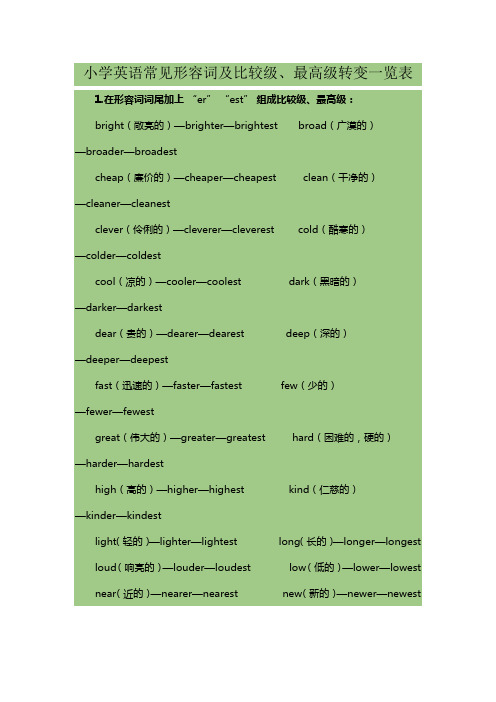
小学英语常见形容词及比较级、最高级转变一览表1.在形容词词尾加上“er” “est”组成比较级、最高级:bright(敞亮的)—brighter—brightest broad(广漠的)—broader—broadestcheap(廉价的)—cheaper—cheapest clean(干净的)—cleaner—cleanestclever(伶俐的)—cleverer—cleverest cold(酷寒的)—colder—coldestcool(凉的)—cooler—coolest dark(黑暗的)—darker—darkestdear(贵的)—dearer—dearest deep(深的)—deeper—deepestfast(迅速的)—faster—fastest few(少的)—fewer—fewestgreat(伟大的)—greater—greatest hard(困难的,硬的)—harder—hardesthigh(高的)—higher—highest kind(仁慈的)—kinder—kindestlight(轻的)—lighter—lightest long(长的)—longer—longest loud(响亮的)—louder—loudest low(低的)—lower—lowest near(近的)—nearer—nearest new(新的)—newer—newestpoor(穷的)—poorer—poorest quick(快的)—quicker—quickestquiet(安静的)—quieter—quietest rich(富裕的)—richer—richestshort(短的)—shorter—shortest slow(慢的)—slower—slowestsmall(小的)—smaller—smallest smart(伶俐的)—smarter—smartestsoft(柔软的)—softer—softest strong(强壮的)—stronger—strongestsweet(甜的)—sweeter—sweetest tall(高的)-taller-tallestthick(厚的)—thicker—thickest warm(温暖的)—warmer—warmestweak(弱的)—weaker—weakest young(年轻的)—younger—youngest2.双写最后一个字母,再加上“er” “est”组成比较级、最高级:big(大的)—bigger—biggest fat(胖的)—fatter—fattest hot(热的)—hotter—hottest red(红的)—redder—reddest sad(悲伤的)—sadder—saddest thin(瘦的)—thinner—thinnestwet(湿的)—wetter—wettest mad(疯的)—madder—maddest3.以不发音的字母e结尾的形容词,加上“r” “st”组成比较级、最高级:able(能干的)—abler—ablest brave(勇敢的)—braver—bravestclose(接近的)—closer—closest fine(好的,完美的)—finer—finestlarge(庞大的)—larger—largest late(迟的)—later—latestnice(好的)—nicer—nicest ripe(成熟的)—riper—ripest rude(粗鲁的)—ruder—rudest safe(安全的)—safer—safeststrange(奇怪的)—stranger—strangest wide(宽广的)—wider—widestwise(睿智的,伶俐的)—wiser—wisest white(白的)—whiter—whitest4.以字母y结尾的形容词,把y改成i,再加上“er” “est”组成比较级、最高级:busy(忙碌的)—busier—busiest dirty(脏的)—dirtier—dirtiestdry(干燥的)—drier—driest early(早的)—earlier—earliest easy(容易的)—easier—easiest friendly(友好的)—friendlier—friendliestfunny(好玩的)—funnier—funniest happy(高兴的)—happier—happiesthealthy(健康的)—healthier—healthiest heavy(重的)—heavier—heaviesthungry(饿的)—hungrier—hungriest lazy(懒惰的)—lazier—laziestlucky(幸运的)—luckier—luckiest naughty(顽皮的)—naughtier—naughtiestnoisy(喧闹的)—noisier—noisiest pretty(美丽的)—prettier—prettiestsilly(傻的)—sillier—silliest spicy(辣的)—spicier—spiciest thirsty(渴的)—thirstier—thirstiest ugly(丑的)—uglier—ugliest5.双音节、多音节形容词,在单词前面加上“more” “most”组成比较级、最高级:afraid(害怕的)—more afraid—most afraidbeautiful(美丽的)—more beautiful—most beautifulcareful(仔细的)—more careful—most carefulcheerful(高兴的)—more cheerful—most cheerfulcrowded(拥堵的)—more crowded—most crowdeddangerous(危险的)—more dangerous—most dangerousdelicious(美味的)—more delicious—most deliciousdifficult(困难的)—more difficult—most difficultexciting(令人兴奋的)—more exciting—most excitingexpensive(昂贵的)—more expensive—most expensivefamous(著名的)—more famous—most famousfrightened(受惊的)—more frightened—most frightenedfrightening(令人害怕的)—more frightening—most frighteninghard-working(勤奋的)—more hard-working—most hard-working helpful(有帮忙的)—more helpful—most helpfulhonest(诚实的)—more honest—most honestimportant(重要的)—more important—most importantinteresting (有趣的)—more interesting—most interestingpolite(有礼貌的)—more polite—most politeterrible(恐怖的)—more terrible—most terribletired(累的)—more tired—most tired6.不规则转变的形容词:bad(坏的)—worse—worst far(远的)—farther—farthest (far—further—furthest)good(好的)—better—best ill(病的)—worse—worstlittle(少的)—less—least many(多的)—more—most much(多的)—more—mostold(年老的)—older—oldest ( old—elder—eldest) well(好的,身体好的)—better—best。
小学英语比较级
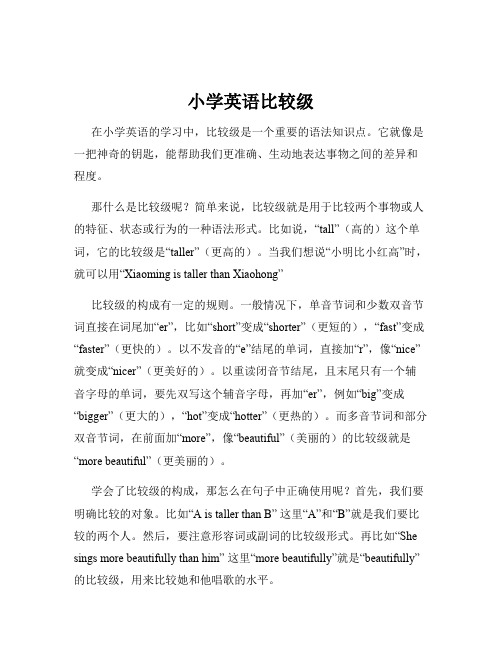
小学英语比较级在小学英语的学习中,比较级是一个重要的语法知识点。
它就像是一把神奇的钥匙,能帮助我们更准确、生动地表达事物之间的差异和程度。
那什么是比较级呢?简单来说,比较级就是用于比较两个事物或人的特征、状态或行为的一种语法形式。
比如说,“tall”(高的)这个单词,它的比较级是“taller”(更高的)。
当我们想说“小明比小红高”时,就可以用“Xiaoming is taller than Xiaohong”比较级的构成有一定的规则。
一般情况下,单音节词和少数双音节词直接在词尾加“er”,比如“short”变成“shorter”(更短的),“fast”变成“faster”(更快的)。
以不发音的“e”结尾的单词,直接加“r”,像“nice”就变成“nicer”(更美好的)。
以重读闭音节结尾,且末尾只有一个辅音字母的单词,要先双写这个辅音字母,再加“er”,例如“big”变成“bigger”(更大的),“hot”变成“hotter”(更热的)。
而多音节词和部分双音节词,在前面加“more”,像“beautiful”(美丽的)的比较级就是“more beautiful”(更美丽的)。
学会了比较级的构成,那怎么在句子中正确使用呢?首先,我们要明确比较的对象。
比如“A is taller than B” 这里“A”和“B”就是我们要比较的两个人。
然后,要注意形容词或副词的比较级形式。
再比如“She sings more beautifully than him” 这里“more beautifully”就是“beautifully”的比较级,用来比较她和他唱歌的水平。
在实际运用中,比较级常常会和一些标志性的词汇一起出现。
比如“than”(比),“much”(……得多),“a little”(一点儿),“even”(甚至)等等。
比如说,“This book is much more interesting than that one”(这本书比那本有趣得多。
小学英语中的比较级和最高级的使用
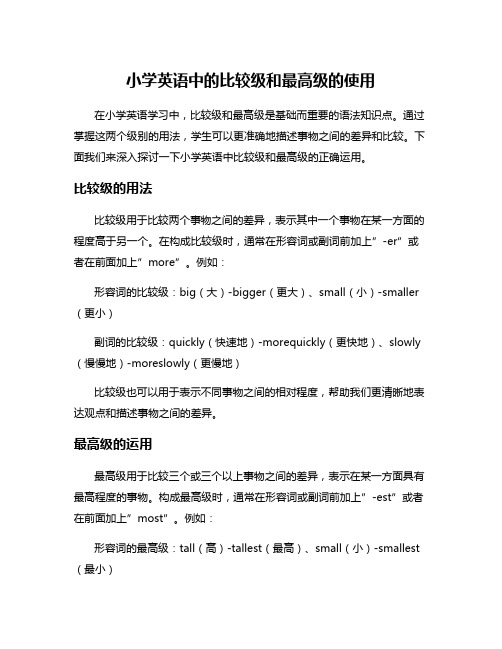
小学英语中的比较级和最高级的使用在小学英语学习中,比较级和最高级是基础而重要的语法知识点。
通过掌握这两个级别的用法,学生可以更准确地描述事物之间的差异和比较。
下面我们来深入探讨一下小学英语中比较级和最高级的正确运用。
比较级的用法比较级用于比较两个事物之间的差异,表示其中一个事物在某一方面的程度高于另一个。
在构成比较级时,通常在形容词或副词前加上”-er”或者在前面加上”more”。
例如:形容词的比较级:big(大)-bigger(更大)、small(小)-smaller (更小)副词的比较级:quickly(快速地)-morequickly(更快地)、slowly (慢慢地)-moreslowly(更慢地)比较级也可以用于表示不同事物之间的相对程度,帮助我们更清晰地表达观点和描述事物之间的差异。
最高级的运用最高级用于比较三个或三个以上事物之间的差异,表示在某一方面具有最高程度的事物。
构成最高级时,通常在形容词或副词前加上”-est”或者在前面加上”most”。
例如:形容词的最高级:tall(高)-tallest(最高)、small(小)-smallest (最小)副词的最高级:slowly(慢慢地)-mostslowly(最慢地)、quickly (快速地)-mostquickly(最快地)最高级帮助我们在描述一组事物中找出在某一方面最突出的事物,使句子更加生动有趣。
通过掌握比较级和最高级的用法,小学生可以在英语学习中更准确地表达自己的想法,丰富句子结构,提高表达能力。
这两个语法知识点是构建英语语言基础的重要组成部分,希望同学们能够在课堂上多加练习,灵活运用,提升英语水平。
掌握比较级和最高级,让我们的英语表达更加生动和精确,希望大家在学习中能够善加利用,取得优异的成绩!。
小学英语形容词、副词比较级:更聪明的学生

小学英语形容词、副词比较级:更聪明的
学生
形容词和副词比较级是英语语法重要的部分,因此对小学生来说,掌握这个部分是非常重要的。
掌握比较级可以让学生描述和比
较他们自己以及周围的人和事物。
本文将介绍几个方法,帮助学生
掌握比较级。
1. 了解规则
首先,学生需要知道比较级的规则。
通常情况下,形容词和副
词比较级会在末尾加-er,例如smarter(更聪明),faster(更快)。
部分比较级则需要在单词前面加 more,例如 more beautiful(更美),more quickly(更快地)。
2. 研究比较级的用法
学生应该了解比较级的用法,如用来比较两个人或物的特质或
状态。
比较级可以让学生描述两个事物之间的差异,例如My dog
is bigger than your dog.(我的狗比你的狗大)。
学生也可以使用比
较级来描述同一物体在不同时间或状态下的变化,例如My sister is feeling better today.(今天我妹妹感觉更好)。
3. 练比较级
最后,对于学生而言,熟练掌握比较级需要大量的练。
老师可以通过一些有趣的练活动来增加学生的兴趣。
例如,老师可以设计角色扮演或对话,让学生在情境中运用比较级,提高学生的语言输出能力。
总之,掌握比较级是小学英语语法的重要部分,尤其是对于想成为更聪明的学生的孩子们。
学生需要首先了解比较级的规则和用法,然后通过大量的练习来提高语言输出能力。
小学英语语法(不规则动词及比较级_最高级的不规则变化)

一、比较级不规则变化1、不规则变化good/well——better——bestbad/badly/ill——worse——worstmany/much——more———mostold——older/elder——oldest/eldestlate——later/latter——latest/lastlittle——less——leastfar——farther/further——farthest/furthest2、单音节不规则变化tired——more tired——most tiredfond——more fond——most fondglad——more glad——most gladbored——more bored——most boredpleased——more pleased——most pleased3、两种变化cruel——crueler——cruelest/more cruel——most cruelstrict——stricter——strictest/more strict——most strictoften——oftener——oftenest/more often——most oftenfriendly——friendlier——friendliest/more friendly——most friendly clever——cleverer——cleverest/more clever——most clever4、没有比较级empty wrong perfect unique extreme excellent favourite favorite true right correct extremely二、过去式不规则变化1、A A A型(动词原形、过去式、过去分词同形)cost(花费)——cost——costcut(割)——cut——cuthit(打)——hit——hithurt (伤害)——hurt——hurtlet(让)——let——letput(放)——put——putread (读)——read——readset(安置)——set——setshut(关闭)——shut——shutbroadcast(广播)——broadcast——broadcastburst(爆发)——burst——burstsplit(切开)——split——split2、AAB型(动词原形与过去式同形)beat(跳动)——beat——beaten3、ABA型(动词原形与过去分词同形)become(变成)——became——becomecome(来)——came——comerun(跑)——ran——run overcome——overcame——overcome4、 ABB型(过去式与过去分词同形)bend(使弯曲)——bentdig(挖)——dug——dugget(得到)——got——gothang(吊死)—— hanged——hangedhang(悬挂)——hung——hunghold(抓住)——held——heldshine(照耀)——shone——shonesit(坐)——sat——satwin(赢)——won——wonmeet(遇见)——met——met keep(保持)——kept——keptsleep(睡)——slept——slept sweep(扫)——swept——sweptfeel(感觉)——felt——felt smell(闻)——smelt——smeltleave(离开)——left——left build(建设)——built——builtlend(借出)——lent——lent send (传送)——sent——sentspend(花费)——spent——spentlose(丢失)——lost——lostburn (燃烧)——burnt——burntlearn(学习)——learnt ——learntmean(意思是)——meant——meantcatch(抓住)——caught——caughtteach(教)——taught——taughtbring(带来)——broughtbroughtfight (战斗)——fought——foughtbuy(买)——bought——boughtthink(想)——thought——thoughthear (听见)——heard——heardsell(卖)——sold——soldtell(告诉)——told——toldsay(说)——said——saidfind(找到)——found——foundhave/has(有)——had——hadmake(制造)——made——madestand(站)——stood——stood understand(明白)——understood——understood5、ABC型(动词原形、过去式与过去分词三者不同形)begin(开始)——began——begundrink(喝)——drank——drunkring(铃响)——rang——rungsing (唱) sang sungswim(游泳) swam swumblow(吹) blew blowndraw(画) drew drawnfly(飞) flew flowngrow(生长) grew grownknow(知道) knew knownthrow(投掷) threw thrown show(出示) showed shownbreak(打破) broke broken choose(选择) chose chosenforget(忘记) forgot forgotten speak(说,讲) spoke spokenwake(醒) woke woken drive(驾驶) drove driveneat(吃) ate eaten fall(落下) fell fallengive(给) gave given rise(升高) rose risentake(取) took taken mistake(弄错) mistook mistakenride(骑) rode riddenwrite(写) wrote writtendo(做) did donego(去) went gonelie(平躺) lay lain lie(说谎) lied liedsee(看见) saw seenwear(穿) wore wornam/is(是) was been are(是) were been。
小学六年级英语:比较级最高级

小学六年级英语:比较级最高级形容词或副词比较级最高级变化规则:1.单音节形容词或副词后面直接加-er或-esttall—taller—tallest fast—faster—fastest2.以-e结尾的单音节形容词或副词直接加-r或-st large—larger—largest nice—nicer—nicest3.以-y结尾的形容词或副词,改y为i再加-er或-est busy—busier—busiest early—earlier—earliest4.形容词或副词是重读闭音节时,双写最后的辅音字母,再加-er或-est hot—hotter—hottest big—bigger—biggest fat-fatter-fattest5.多音节形容词或副词前面直接加more或mostdelicious—more delicious—most deliciousbeautiful—more beautiful—most beautiful6.不规则变化good (well)—better—best bad (badly)—worse—worst练习题:一. 词形变换。
比较级最高级large _________________ ___________________fast _________________ ___________________easy _________________ ___________________wet _________________ ___________________good _________________ ___________________important _________________ ___________________well __________________ ___________________bad _________________ ___________________many _________________ ___________________little _________________ ___________________far _________________ ___________________strong _________________ ___________________patient _________________ ___________________safe _________________ ___________________expensive _________________ ___________________二. 选择填空。
小学英语比较级知识点
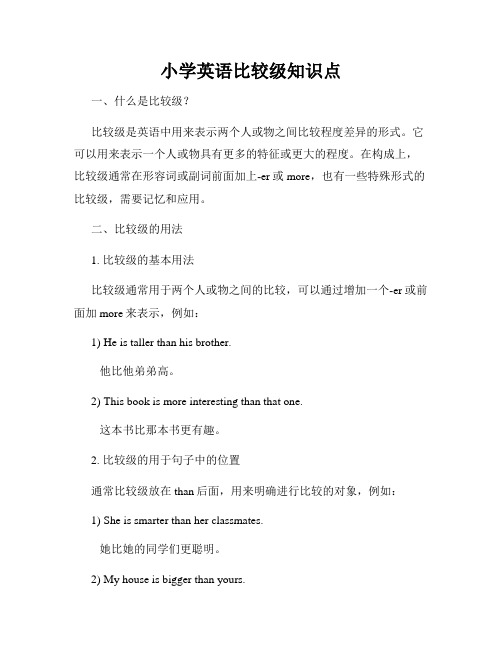
小学英语比较级知识点一、什么是比较级?比较级是英语中用来表示两个人或物之间比较程度差异的形式。
它可以用来表示一个人或物具有更多的特征或更大的程度。
在构成上,比较级通常在形容词或副词前面加上-er或more,也有一些特殊形式的比较级,需要记忆和应用。
二、比较级的用法1. 比较级的基本用法比较级通常用于两个人或物之间的比较,可以通过增加一个-er或前面加more来表示,例如:1) He is taller than his brother.他比他弟弟高。
2) This book is more interesting than that one.这本书比那本书更有趣。
2. 比较级的用于句子中的位置通常比较级放在than后面,用来明确进行比较的对象,例如:1) She is smarter than her classmates.她比她的同学们更聪明。
2) My house is bigger than yours.我的房子比你的大。
3. 比较级与than连用时的变化当比较级与than连用时,需要注意形容词或副词的变化。
一般规则是单音节形容词或副词在词尾加-er,双音节及多音节形容词或副词前加more,例如:1) Jim is taller than Tom.吉姆比汤姆更高。
2) The blue dress is prettier than the green one.蓝色的裙子比绿色的漂亮。
4. 比较级与不定代词连用时的变化当比较级与不定代词连用时,形容词或副词的变化与前面相同,例如:1) Nobody is as clever as Lucy.没有人像露西一样聪明。
2) Tim has more toys than anyone else in the class.蒂姆拥有班上比任何人都多的玩具。
三、比较级的特殊形式1. 以辅音字母+y结尾的形容词当形容词以辅音字母+y结尾时,需要将y变为i,然后再加-er构成比较级,例如:1) happy → happier幸福的→ 更幸福的2) funny → funnier有趣的→ 更有趣的2. 以重读闭音节结尾的形容词当形容词以重读闭音节结尾,并且末尾只有一个辅音字母时,需要双写末尾的辅音字母,然后再加-er构成比较级,例如:1) big → bigger大的→ 更大的2) hot → hotter热的→ 更热的3. 不规则比较级有一些形容词的比较级是不规则的,需要特殊记忆,例如:1) good → better好的→ 更好的2) bad → worse坏的→ 更坏的四、比较级的否定形式比较级的否定形式通常是在形容词或副词前加not,也可以使用less 来构成否定形式,例如:1) This movie is not as long as the previous one.这部电影没有前一部长。
(完整版)小学英语比较级

一、形容词、副词的比较级和最高级的构成规则1.大多数单词的变法small→smaller→smallest short→shorter→shortest great→greater→greatest clever→clevere r→cleverest narrow→narrower→narrowest tall→taller→tallest2.以不发音e结尾的单音节词,比较在原级后加-r,最高级在原级后加-st;large→larger→largest nice→nicer→nicest3.先双写末尾的辅音字母,比较级加-er,最高级加-est;big→bigger→biggest hot→hotter→hottest fat→fatter→fattest thin-thinner-thinnest sad-sadder--sa ddest 4.以“辅音字母+y”结尾的双音节词,把y改为i,比较级加-er,最高级加-est;easy→easier→easiest heavy→heavier→heaviest busy→busier→busiesthappy→happier→happiest5.其他双音节词和多音节词,比较级在前面加more,最高级在前面加most;beautiful→more beautiful→most beautifuldifferent→more different→most different注意:(1)形容词最高级前通常必须用定冠词 the,副词最高级前可不用。
6.有少数形容词、副词的比较级和最高级是不规则的,必须熟记。
good-----better------best好的well------better------best身体好的bad------worse------worst坏的ill--------worse-------worst病的many--------more------most许多 much------more--------most许多few------less-------least少数几个little-------less------least少数一点far------further------furthest更进一步,程度far------farther------farthest更远,路程old-------older------oldest年老的(指年纪)old------elder-------eldest年老的(指兄弟姐妹的排行)二、形容词、副词的比较级和最高级的用法1.“A + be +形容词比较级 + than + B”意思为“A比B更……”。
(完整版)小学生英语---比较级及练习

比较级得变化规则1.一般在原级后加er构成比较级,加est构成最高级。
e.g. small smaller smallestyoung younger youngest2.以不发音的字母e结尾的形容词,直接加r或st构成比较级和最高级。
e.g. nice nicer nicestlate later latest 3.以辅音字母+y结尾的形容词,变y为i,再加er或est,构成比较级和最高级。
e.g. busy busier busiestheavy heavier heaviest 4.在重读闭音节中,末尾只有一个辅音字母的形容词,要先双写这个辅音字母,再加er或est,构成比较级和最高级。
e.g.hot hotter hottest big bigger bi ggest5.个别形容词的比较级和最高级是不规则变化,需个别记忆。
e.g. good (well) better bestbad (badly, ill) worse worstmany(much) more mostlittle less leastfar father farthest (一)写出下列形容词与副词的比较级Long _____ wide ______ fat ____heavy ______ slow ______ few____bright______ far ______ many_____happy____nice______much ______old______ busy____ hot______slow ____ thin _____ clean_______big ______ cold ______ young______(二)用所给词的正确形式填空:1. Bob is _________ ( young ) than Ben.2. Sally is not as ___________ (tall) as Ada.3. Which is _________ (heavy), a hen or a chicken?4. How _________ (tall) is Sally?5. A dictionary is much ______________________ (expensive) thana story-book.6. An orange is a little ______ (big) than an apple, but much ________ (small) than a watermelon.7. My home is much ______ (far) than his.8. You look much ______than before. (thin)9. This dish is _______________ than the cake. ( delicious )10. My room is _________ than your room. (clean)(三) 选择题1. Bob is ___________ than Tom.A tallB tallerC talles2. Which is ___________ a monkey or a zebra?A heavyB heavierC heavyer3. He is much ________ than Sally.A goodB betterC best4. Ben is ________than Peg.A popularB more popularC popularer5. This question is ________ than that one.A easyB easierC easiest6. The chair is _________ than the door.A more expensiveB expensiverC expensivest7. The basketball is ________ than the football.A bigB biggerC biggest8. Her dress is _______ than my dress.A beautifulB beautifulerC more beautiful9. She is __________ than my sister.A oldB olderC oldest10.My hair is _______ than your hair.A longB longerC longest11. The flower is ____ than the bees.A manyB moreC most12. My aunt drives much _____ than my mother.A betterB much betterC best13. Winter is ______ than autumn.A coldB colderC colder14. My brother is _____than my sister.A busyB busierC busyer15. The pig is ____than the bird.A fatB fatterC fattest。
小学生英语比较级及练习
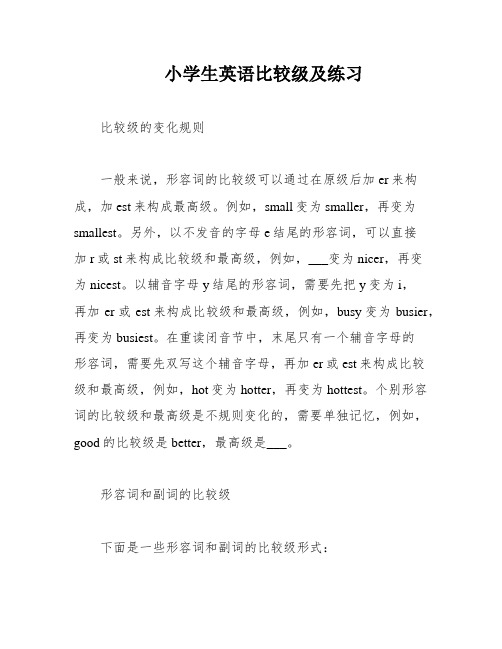
小学生英语比较级及练习比较级的变化规则一般来说,形容词的比较级可以通过在原级后加er来构成,加est来构成最高级。
例如,small变为smaller,再变为smallest。
另外,以不发音的字母e结尾的形容词,可以直接加r或st来构成比较级和最高级,例如,___变为nicer,再变为nicest。
以辅音字母y结尾的形容词,需要先把y变为i,再加er或est来构成比较级和最高级,例如,busy变为busier,再变为busiest。
在重读闭音节中,末尾只有一个辅音字母的形容词,需要先双写这个辅音字母,再加er或est来构成比较级和最高级,例如,hot变为hotter,再变为hottest。
个别形容词的比较级和最高级是不规则变化的,需要单独记忆,例如,good的比较级是better,最高级是___。
形容词和副词的比较级下面是一些形容词和副词的比较级形式:___Wide wider widest___Heavy ____________Far farther farthest Many more most Happy happier happiest ______ mostOld older oldestBusy busier busiest___1/4slow slower slowest ____________Young younger youngest填空题1.Bob is younger than Ben.2.Sally is not as tall as Ada.3.Which is heavier。
a hen or a chicken?4.How tall is Sally?5.A nary is much less ___.6.___ than an apple。
but much ___.7.My home is much farther than his.8.You look much thinner than before.9.This dish is more us than the cake.10.My room is cleaner than your room.1.B ___2.B ___3.B better4.B ___5.B easier6.A more ___7.B bigger8.C more beautiful9.B older___.11.___.12.My aunt is a much better driver than ___.13.Winter is colder than ___.14.___.15.The pig is fatter than the bird.。
小学英语形容词、副词比较级:更好的成绩
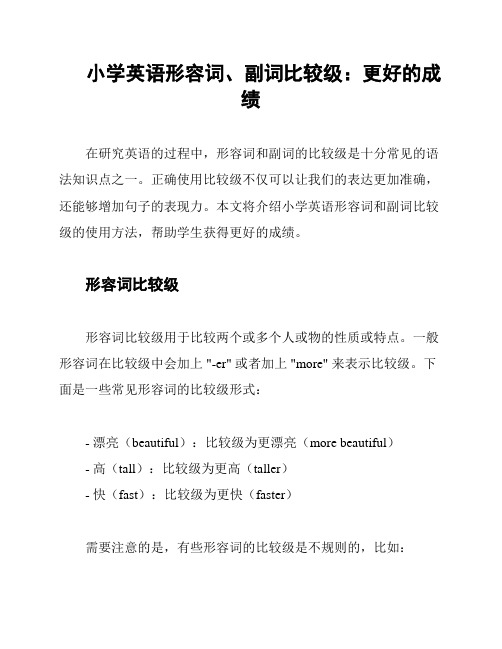
小学英语形容词、副词比较级:更好的成绩在研究英语的过程中,形容词和副词的比较级是十分常见的语法知识点之一。
正确使用比较级不仅可以让我们的表达更加准确,还能够增加句子的表现力。
本文将介绍小学英语形容词和副词比较级的使用方法,帮助学生获得更好的成绩。
形容词比较级形容词比较级用于比较两个或多个人或物的性质或特点。
一般形容词在比较级中会加上 "-er" 或者加上 "more" 来表示比较级。
下面是一些常见形容词的比较级形式:- 漂亮(beautiful):比较级为更漂亮(more beautiful)- 高(tall):比较级为更高(taller)- 快(fast):比较级为更快(faster)需要注意的是,有些形容词的比较级是不规则的,比如:- 好(good):比较级为更好(better)- 少(few):比较级为更少(fewer)在使用形容词的比较级时,需要注意以下几点:1. 当形容词以 "e" 结尾时,直接加上 "-r" 即可,例如:nice → nicer。
2. 当形容词以辅音字母结尾时,要重复该辅音字母并加上 "-er",例如:big → bigge r。
3. 当形容词以 "y" 结尾时,要将 "y" 变为 "i" 并加上 "-er",例如:happy → happier。
副词比较级副词比较级用于比较两个或多个动作的程度或者速度。
一般副词在比较级中会加上 "-er" 或者加上 "more" 来表示比较级。
下面是一些常见副词的比较级形式:- 快速地(quickly):更快速地(more quickly)- 好好地(well):更好地(better)- 少(little):更少(less)需要注意的是,有些副词的比较级是不规则的,比如:- 好(well):比较级为更好(better)- 多(much):比较级为更多(more)使用副词比较级时,需要注意以下几点:1. 当副词以 "e" 结尾时,直接加上 "-r" 即可,例如:nice → nicer。
小学英语形容词比较级
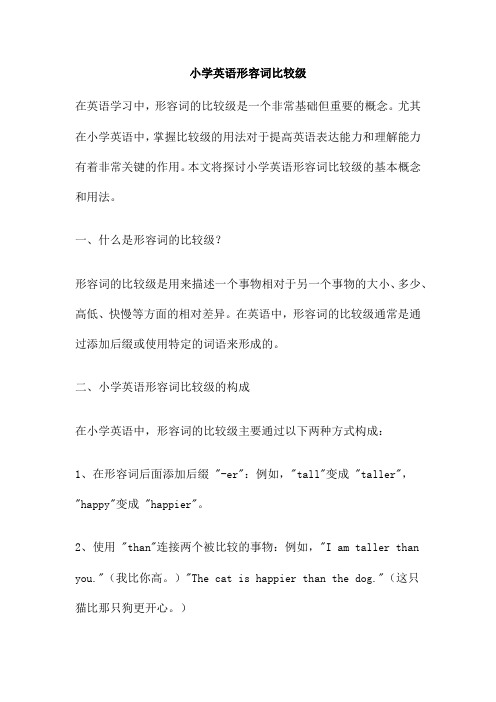
小学英语形容词比较级在英语学习中,形容词的比较级是一个非常基础但重要的概念。
尤其在小学英语中,掌握比较级的用法对于提高英语表达能力和理解能力有着非常关键的作用。
本文将探讨小学英语形容词比较级的基本概念和用法。
一、什么是形容词的比较级?形容词的比较级是用来描述一个事物相对于另一个事物的大小、多少、高低、快慢等方面的相对差异。
在英语中,形容词的比较级通常是通过添加后缀或使用特定的词语来形成的。
二、小学英语形容词比较级的构成在小学英语中,形容词的比较级主要通过以下两种方式构成:1、在形容词后面添加后缀 "-er":例如,"tall"变成 "taller","happy"变成 "happier"。
2、使用 "than"连接两个被比较的事物:例如,"I am taller than you."(我比你高。
)"The cat is happier than the dog."(这只猫比那只狗更开心。
)三、小学英语形容词比较级的用法在英语句子中,我们通常会用到比较级来描述两个或多个事物的相对差异。
在小学英语中,常见的用法包括:1、比较两个事物的差异:例如,"The apple is bigger than the orange."(这个苹果比那个橘子大。
)"John runs faster than Mary."(约翰跑得比玛丽快。
)2、表达自己的喜好或偏好:例如,"I like the blue shirt better than the red one."(比起红色的,我更喜欢蓝色的衬衫。
)"My brother prefers chocolate to ice cream."(我弟弟更喜欢巧克力而不是冰淇淋。
- 1、下载文档前请自行甄别文档内容的完整性,平台不提供额外的编辑、内容补充、找答案等附加服务。
- 2、"仅部分预览"的文档,不可在线预览部分如存在完整性等问题,可反馈申请退款(可完整预览的文档不适用该条件!)。
- 3、如文档侵犯您的权益,请联系客服反馈,我们会尽快为您处理(人工客服工作时间:9:00-18:30)。
一、形容词、副词的比较级和最高级的构成规则
1.大多数单词的变法
small→smaller→smallest short→shorter→shortest great→greater→greates t clever→cleverer→cleverest narrow→narrower→narrowest tall→taller→t allest
2.以不发音e结尾的单音节词,比较在原级后加-r,最高级在原级后加-st;
large→larger→largest nice→nicer→nicest
3.先双写末尾的辅音字母,比较级加-er,最高级加-est;
big→bigger→biggest hot→hotter→hottest fat→fatter→fattest thin-thinner-t hinnest sad-sadder--saddest 4.以“辅音字母+y”结尾的双音节词,把y改为i,比较级加-er,最高级加-est;
easy→easier→easiest heavy→heavier→heaviest busy→busier→busiest happy→happier→happiest
5.其他双音节词和多音节词,比较级在前面加more,最高级在前面加most;beautiful→more beautiful→most beautiful
different→more different→most different
注意:(1)形容词最高级前通常必须用定冠词 the,副词最高级前可不用。
6.有少数形容词、副词的比较级和最高级是不规则的,必须熟记。
good-----better------best好的
well------better------best身体好的
bad------worse------worst坏的
ill--------worse-------worst病的
many--------more------most许多 much------more--------most许多
few------less-------least少数几个little-------less------least少数一点far------further------furthest更进一步,程度
far------farther------farthest更远,路程
old-------older------oldest年老的(指年纪)
old------elder-------eldest年老的(指兄弟姐妹的排行)
二、形容词、副词的比较级和最高级的用法
1.“A + be +形容词比较级 + than + B”意思为“A比B更……”。
如:This tree is taller than that one. 这棵树比那棵树高。
注意:①在含有连词than的比较级中,前后的比较对象必须是同一范畴,即同类事物之间的比较。
②在比较级前面使用much,表示程度程度“强得多”。
如:A watermelon is much bigger than an apple.
2.“比较级 + and + 比较级”或“more and more +原级”表示“越来越……”
It becomes warmer and warmer when spring comes. 春天来了,天气变得越来越
暖和了。
It is getting cooler and cooler.天气越来越凉爽。
The wind became more and more heavily.风变得越来越大。
Our school is becoming more and more beautiful. 我们的学校变得越来越美
丽。
3. “the +比较级……, the+比较级”,表示“越……越……”。
The more money you make, the more you spend.钱你赚得越多,花得越多。
The sooner,the better. 越快越好。
4.形容词、副词的最高级形式主要用来表示三者或三者以上人或事物的比较,表示“最……”的意思。
句子中有表示范围的词或短语。
如:of the three, in our class 等等。
如:He is the tallest in our class. 他在我们班里是最高的。
5. 比较级与最高级的转换:
Mike is the tallest intelligent in his class.
Mike is more taller than any other student in his class.
【练习】
写出比较级和最高级:
small fast
heavy beautiful
busy delicious
old young
thin big
high well
early slow
shot much
long tall
nice happy
hot fat
many far
ill bad
good little
一.1. My school is _____, but Tom’s school is _____than mine. And Sally’s school is the _________. (small)
2. Rabbits can run _______, but tigers can run _____ than rabbits, and cheetahs can run ___________of the three. (fast)
3.Pig is ________, but deer is ______than pig, and elephant is the
______________ (heavy)
4. I’m ___________, but she is _______ than me. (beautiful)
5. Every day is _______. But today is the ______ day I have ever had. (busy)
6. I think pizza is the ________ food of all. (delicious)
7.My brother is two years ______ (old) than me.
8. Is your sister _______(young) than you? Yes,she is.
9. Who is ________(thin),you or Helen? Helen is.
10. Whose pencil-box is _____ (big),yours or hers? Hers is. 11.Ben jumps ______ (high) than some of the boys in his class. 12.Does Nancy sing ______(well) than Helen? Yes, she does. 13.My eyes are ________(big) than hers.
14.Which is ________(heavy),the elephant or the pig?
15.Who gets up ______ (early),Tim or Tom?
16.Do the girls get up____(early) than the boys? No,they______. 17.Jim runs ____ (slow). But Ben runs _____(slow).
二,根据句意写出所缺的单词
(1) I’m 12 years old.You’re 14. I’m than you.
(2) A rabbit’s tail is than a monkey’s tail.
(3) An elephant is than a pig.
(4) A lake is than a sea.
(5) A basketball is than a football.
三,选出合适的单词完成句子
heavy tall long much many big
(1) How is the Yellow River?
(2) How is Mr Green? He’s 175cm.
(3) How are your feet? I wear size 18.
(4) How is the white T-shirt? It’s 100 yuan.
(5) How apples are there in the bag? There are 5.
(6) How is the fish? It’s 2kg.。
